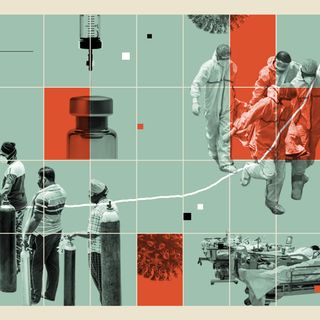
Woe Is Me! “I Have A Ph.D. Why Am I Still Insecure Around Highly Educated People?”
A series in which The Swaddle team indulges your pity party with advice you’ll probably ignore.

Woe Is Me! is a series in which The Swaddle team indulges your pity party with advice you’ll probably ignore.
“This is a new kind of anxiety I have cultivated, or I don’t know — always have had. If my date or any other person I meet from my field is an Ivy League-educated person, I lose my self esteem in seconds. I put them on a pedestal and quickly get intimidated by them, can’t even talk with the right mind, because I think whatever I will say I will sound like an idiot. And even when applying for jobs my thinking process works the same way, I think if an Ivy League person is applying for the same job my application will be discarded anyway. To be fair, I myself have a great education from the top-level institutions in India and my professional life is also fairly decent in my field, I am about to get my Ph.D. degree. I am worried if things go like this can I even flourish in my career?“
— Genius-In-Training
KB: You’re right, it will be hard to flourish if you are constantly doubting yourself! I’m going to tell you a bit of a secret that almost no adult will reveal to you as you’re growing up: absolutely zero adults have their shit completely together. The thing is, when you’re a kid, the adults in your life seem omniscient and omnipotent. In the same ways, when you are relatively new to a particular academic pursuit or a professional environment, the people ‘senior’ to you in this field will also seem like they are intellectually superior and impossibly accomplished. However, it’s important to remember that none of those people actually know everything, they are simply more experienced gatekeepers of their field’s jargon. They have spent more time speaking the language of knowledge for that work, and they know how to reflect a patina of seniority and expertise. But that doesn’t mean they know more than you, are smarter than you, or deserve more praise or admiration than you. You need to recognize that the trappings of expertise don’t matter; that you are smart, talented, and accomplished, and just because you don’t talk or present the same way those people do, that doesn’t mean you don’t deserve to inhabit those spaces proudly. And while this confidence may not come easily, it will come with time. Stick it out and assert yourself whenever you can — you are no less worthy of people’s attention and respect.
SM: It’s great that you’ve been able to share this anxiety and want to think it through. Half the work of dealing with it is already done, because most of the time, we find it difficult to acknowledge and process these anxieties in a healthy way. That being said, you’re absolutely right in being concerned, not just about whether this will prevent you from flourishing in your career, but about being happy in life in general. We’ve been taught to view people’s thought processes and the value of the way they think in certain straightjacket ways, and this notion is just another part of that. In my experience, I’ve seen that people who are able to free themselves from this notion are able to value the world and people around them way more, and see value outside of the ways in which they’ve been conditioned to see it. So, yes, it will impact your ability as a professional, not only because you’ll keep doubting your self-worth, but more importantly because you won’t be able to value and appreciate what everyone brings to the table, with or without Ivy League or any other kinds of degrees for that matter. I think the first step in the process is to acknowledge and understand this and read and learn more about this, and the rest will follow from there.
AS: Hey there, Doc. (Congratulations on your Ph.D!) I think it’s very normal to compare yourself to others and feel anxious, even though you know your own achievements are brilliant. So, I guess my first suggestion would be: don’t be so hard on yourself for feeling this way. Even these Ivy League people you’re meeting would have their own insecurities, so it might be helpful to just accept it as a part of human nature. At the same time, it’s also not healthy if these anxieties impact your everyday life this much. I’m sure you know enough about the education industry to know that where people study does not necessarily make them any smarter, or less smart than you. There are entire systems of privilege, affordability, elitism that come in the way of real merit (and how do we measure ‘real’ merit, anyway?) Basically, I’m of the opinion that there will always be people who are fancier than us, on paper. So, it’s more worthwhile not to let our entire self-worth rest on our resumé. Maybe try to actively hype yourself up, and think of those intangible things that make you proud of yourself. Is it your sense of humor or empathy? Maybe you’re great at getting people to open up to you? Or, perhaps a recent project had a positive impact on-ground? Highlight these achievements when you’re thinking of yourself, or talking about yourself to other people, and really let it sink in.
DR: I think it’s quite natural to feel the way you’re feeling — but from time to time; we all have our moments of self-doubt. I noticed, however, that you’re confused as to whether you’ve always been this way, or if it’s a “new kind of anxiety [you] have cultivated” — I would urge you to delve deeper and find that answer. Here’s why: if it’s new, perhaps, trying to recall if any specific event triggered it might help you overcome the anxiety by processing that particular event. If it has always existed, however, I would suggest you try to unpack the source of the insecurity — perhaps, with the help of a therapist?
Since you’ve mentioned feeling inferior to Ivy League grads, it may also help to ponder why. I know they’re glorified, but having had professors from both Ivy League colleges and reputed Indian institutions teach me in college, I’m not sure the institutional stamp on one’s college degree is truly a marker of their competence.
Also, there exists a theory that highly competent people are quite likely to underestimate their competence — is it possible that’s what’s happening to you? If so, here’s a thought: perhaps, what you’re feeling is just a pitfall of actually being really competent. How’s that for a confidence boost?
Related


The Buzz Cut: A Pile of Martian Dirt May Soon Be the Most Expensive Thing on Earth
